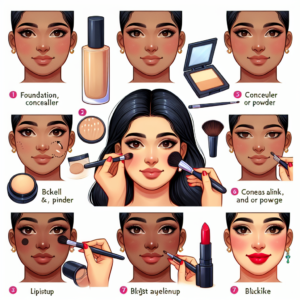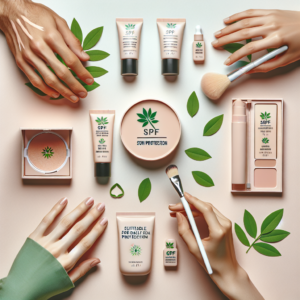
Key Takeaways
- Mineral sunscreens, often recommended for sensitive skin, use zinc oxide or titanium dioxide to physically block UV rays.
- Chemical sunscreens absorb into the skin and then absorb UV rays, converting them into heat, which is then released from the skin.
- Vegan sunscreens are free from animal-derived ingredients and are not tested on animals.
- For sensitive skin, look for sunscreens without fragrances, parabens, or alcohol, which can cause irritation or allergic reactions.
- Always opt for broad-spectrum sunscreens to protect against both UVA and UVB rays, and choose SPF 30 or higher for adequate protection.
| Aspect | Mineral Sunscreens | Chemical Sunscreens |
|---|---|---|
| Definition | Create a physical barrier that reflects UV rays; contain zinc oxide or titanium dioxide. | Contain organic compounds that absorb UV rays and convert them into heat. |
| Recommended for | Sensitive skin due to less irritation; those concerned about ingredient absorption into the bloodstream. | Broader range of skin types; those who prefer a lighter texture. |
| Key Ingredients | Zinc oxide, titanium dioxide. | Oxybenzone, avobenzone, octisalate, homosalate. |
| Skin Benefits | Less likely to cause irritation or allergic reactions; effective against a broad spectrum of UV radiation. | Newer formulations are gentler, less likely to irritate; effective UV protection. |
| Environmental Impact | Often more environmentally friendly; reef-safe. | Some ingredients have been implicated in coral reef bleaching. |
| Texture and Application | Historically thicker, but newer formulas are more lightweight and spreadable. | Generally lighter, easier to blend into the skin without leaving a white cast. |
| Product Recommendations | Sunflower Shield, Earth Guard Tinted Protector, Pure Radiance Mineral Veil. | Clear Defense Sheer Sunscreen, Ultra Light Sun Fluid, Sensitive Skin Sun Shield. |
Finding the Right Vegan SPF for Sensitive Skin
First things first, sensitive skin needs a gentle touch. If your skin tends to react to new products, it’s crucial to pick a sunscreen that’s as pure and simple as possible. Look for products labeled ‘hypoallergenic’ and ‘non-comedogenic’ to minimize the risk of irritation and breakouts. And remember, a higher SPF doesn’t always mean better for sensitive skin—it’s the ingredients that count.
Understanding Vegan SPF and Its Importance
Vegan SPF means that the sunscreen doesn’t contain any animal-derived ingredients and wasn’t tested on animals. But why is this important? For starters, it aligns with a cruelty-free lifestyle. But it’s also about purity—plant-based ingredients can be less irritating for sensitive skin. And let’s not forget, what we put on our skin can affect the environment, so vegan SPF is often a more eco-conscious choice.
Criteria for Choosing the Right Product
Choosing the right vegan SPF for sensitive skin means looking at the ingredients list. Avoid common irritants like fragrances, parabens, and alcohol. Instead, search for calming ingredients like aloe vera and chamomile. And because sensitive skin can also be reactive, opt for mineral sunscreens which sit on top of the skin rather than being absorbed.
Mineral vs Chemical Sunscreens: A Brief Overview
Defining Mineral Sunscreens
Mineral sunscreens are sometimes called physical sunscreens because they create a physical barrier on the skin’s surface that reflects UV rays. The active ingredients to look for are zinc oxide and titanium dioxide. They’re less likely to cause skin irritation, making them a top choice for those with sensitive skin. And because they don’t absorb into the skin, they’re also less likely to be absorbed into the bloodstream, which is a concern for some people.
Defining Chemical Sunscreens
On the other hand, chemical sunscreens contain organic (carbon-based) compounds, like oxybenzone, avobenzone, octisalate, and homosalate, which create a chemical reaction and work by absorbing UV rays. As they absorb the rays, they transform them into heat, which is then released from the skin. While effective, these can sometimes be more irritating for those with sensitive skin.
Stay tuned as we delve deeper into the benefits of vegan mineral SPF for sensitive skin and guide you through making the best choice for your skin and lifestyle.
Benefits of Vegan Mineral SPF for Sensitive Skin
Imagine a gentle shield, one that protects without provoking your skin. That’s what mineral SPF does. It’s particularly beneficial for sensitive skin because it doesn’t penetrate the skin barrier. Instead, it sits on top, providing protection without the risk of irritation that some chemical filters can cause. Plus, mineral ingredients are less likely to degrade in sunlight, which means they can offer more stable protection throughout the day.
Zinc Oxide and Titanium Dioxide as Skin Protectors
Zinc oxide and titanium dioxide are the superheroes of vegan mineral SPF. They are effective against a broad spectrum of UV radiation, meaning they protect against both UVA and UVB rays. Zinc oxide is also known for its skin-soothing properties, making it a go-to for those with sensitive or even acne-prone skin. Both ingredients are also reef-safe, which is a win for ocean lovers.
Reducing the Risk of Irritation and Allergies
Mineral sunscreens are less likely to cause allergic reactions because they contain fewer ingredients that can penetrate the skin and trigger sensitivities. If your skin is easily upset, mineral sunscreen is your ally. It’s like choosing a cotton t-shirt over one with scratchy tags and seams—it’s all about comfort and care.
Advanced Vegan Chemical Filters
Now, not all chemical filters are off the table for sensitive skin. Advances in skincare technology have brought us new, gentler chemical filters that are less likely to cause irritation. Some newer vegan chemical sunscreens are formulated without oxybenzone and octinoxate, which are known for their potential to cause sensitivities and environmental harm.
Lighter Textures and Their Advantages
One of the biggest advancements in vegan SPF is the development of lighter textures that blend seamlessly into the skin without leaving a white cast. This is a game-changer, especially for those with deeper skin tones who have historically struggled to find mineral sunscreens that don’t leave a chalky residue. Now, you can protect your skin without compromising on texture or appearance.
Comparative Analysis: Which One Trumps for Sensitive Skin?
Immediate and Long-Term Skin Health
For immediate protection, both mineral and chemical sunscreens can be effective. However, for long-term skin health, mineral sunscreens have the edge. They’re less likely to cause irritation or contribute to skin conditions like rosacea or melasma. And since they reflect UV rays rather than absorb them, they keep the skin cooler, which can prevent heat-induced pigmentation.
Environmental Considerations
Besides being kind to your skin, mineral sunscreens are often more environmentally friendly. They lack the chemicals that have been implicated in coral reef bleaching and are generally considered safer for marine life. So, by choosing a vegan mineral SPF, you’re not only doing your skin a favor but also the planet.
Application and Comfort
Let’s talk about the feel. Mineral sunscreens have come a long way from the thick, paste-like formulas of the past. Many now have a lightweight, easily spreadable texture that makes application a breeze. And for sensitive skin, comfort is key—you want a sunscreen that you can apply and reapply without dreading how it will feel on your skin.

Detailed Guide on Choosing the Best Vegan SPF
Identifying Your Skin Type and Needs
Before you choose a vegan SPF, take a moment to assess your skin. Is it dry, oily, combination, or sensitive? Does it burn easily or are you prone to pigmentation? Your skin’s needs will dictate the kind of sunscreen you should opt for. For dry skin, a mineral SPF with hydrating ingredients might be best, while oily skin might benefit from a lighter, fluid texture.
Key Ingredients to Look For
When scanning the shelves for a vegan SPF, here are some key ingredients to keep an eye out for:
- Zinc Oxide: Offers broad-spectrum protection and is known for its soothing properties.
- Titanium Dioxide: Another broad-spectrum protector, less likely to cause irritation.
- Antioxidants: Ingredients like green tea extract or vitamin C can help combat free radicals.
- Hydrators: For drier skin, look for added moisturizers like hyaluronic acid or glycerin.
Reading Labels: Spotting Potential Irritants
Reading labels is like detective work for your skin. Keep an eye out for potential irritants such as fragrances, parabens, and alcohols. If you’re not sure about an ingredient, a quick search can help you understand its purpose and whether it’s likely to be kind or cruel to your skin.
With these tips in mind, you’re well on your way to finding a vegan SPF that keeps your skin happy, healthy, and protected. In the next section, we’ll explore some top product recommendations to get you started on your journey to kinder, conscious skincare.
Mineral SPF Product Recommendations
For those with sensitive skin seeking a gentle, effective vegan mineral SPF, here are some top picks:
- Sunflower Shield – With its high zinc oxide content, it offers excellent broad-spectrum protection and is infused with botanicals to soothe sensitive skin.
- Earth Guard Tinted Protector – A tinted option that blends effortlessly into various skin tones, providing both UV protection and a touch of coverage.
- Pure Radiance Mineral Veil – Lightweight and ideal for daily use, this sunscreen doesn’t leave a white cast and is fortified with antioxidants.
Chemical SPF Product Recommendations
If you prefer chemical sunscreens and have sensitive skin, look for products with newer, gentler chemical filters. Here are some vegan-friendly options that are less likely to irritate:
- Clear Defense Sheer Sunscreen – This one uses innovative filters to offer high protection without the harsh ingredients that can upset sensitive skin.
- Ultra Light Sun Fluid – With a watery texture that sinks in quickly, it’s perfect for those who dislike the feel of traditional sunscreens.
- Sensitive Skin Sun Shield – Specifically formulated for reactive skin types, this sunscreen provides protection without common irritants.
Frequently Asked Questions (FAQ)
What Makes a Sunscreen Vegan?
A sunscreen is considered vegan if it does not contain any animal-derived ingredients and has not been tested on animals. This means no beeswax, lanolin, collagen, or any other ingredient sourced from animals. It’s not only about being cruelty-free but also ensuring that the product aligns with a plant-based lifestyle.
Can Mineral Sunscreens Fully Protect Darker Skin Tones?
Yes, mineral sunscreens can fully protect darker skin tones. The key is to choose a formula that is sheer or tinted to blend well with your skin tone. Modern formulations have improved significantly, offering protection without the white residue that was once a common drawback for those with darker complexions.
How Often Should I Reapply Vegan SPF?
Regardless of your skin type, you should reapply sunscreen every two hours when you’re out in the sun. If you’re swimming or sweating, reapply immediately after drying off. And even if you’re using water-resistant sunscreen, don’t forget to reapply—no sunscreen is completely waterproof.
Remember, the best sunscreen is the one you’ll actually use. So find a texture and formula you love, and make it a non-negotiable part of your daily routine.
Are There Eco-friendly Vegan SPF Options?
Absolutely! Eco-friendly vegan SPF options are available that use biodegradable ingredients and sustainable packaging. These sunscreens are not only kind to your skin but also mindful of the planet. Look for brands that are transparent about their ingredients and their environmental impact.
Do Vegan SPF Products Have an Expiration Date?
Yes, like all sunscreens, vegan SPF products do have an expiration date. It’s usually found on the packaging. Using sunscreen past its expiration date can mean less effective protection, so always check the date and replace your sunscreen as needed.
Pro Tip: Write the date of purchase on your sunscreen bottle with a permanent marker. This way, you’ll always know how long you’ve had it, even if the printed expiration date rubs off.
Choosing the right vegan SPF for your sensitive skin is a significant step toward a healthier, more conscious skincare routine. Whether you opt for a mineral or chemical sunscreen, the key is to find a product that offers the protection you need without causing irritation or harm to the environment. With the recommendations and tips provided, you’re well-equipped to make a choice that’s not only safe for your skin but also aligns with your values. Happy sun protecting!




